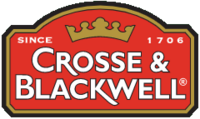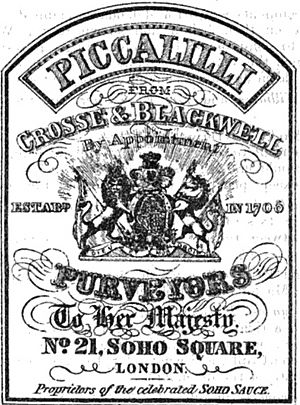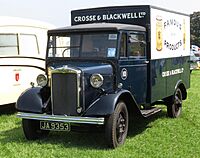- This page was last modified on 1 January 2026, at 00:02. Suggest an edit.
Crosse & Blackwell facts for kids
 |
|
|
Formerly
|
West and Wyatt |
|---|---|
| Private (1706–1960) | |
| Industry | Food |
| Fate | Acquired by Nestlé, becoming a brand |
| Founded | 1706 |
| Products | Condiments, marmalades, meat sauces, seafood sauces, mincemeats, mustard, pickles, pickled onions |
| Brands |
List
|
| Owner |
|
Crosse & Blackwell is a well-known English food brand. It started as a company in London way back in 1706. Later, in 1830, two people named Edmund Crosse and Thomas Blackwell bought it.
The company became very successful on its own. Then, in 1960, a big Swiss company called Nestlé bought it. Nestlé owned the brand until 2002.
Today, Crosse & Blackwell makes many different food items. These include condiments (like sauces), marmalades, mustard, and various kinds of pickles and pickled onions.
Contents
The Story of Crosse & Blackwell
How it All Began
The company's journey started in 1706. It was first known as Jackson's, a business that sold goods from other countries. Later, it changed its name to West & Wyatt. This company became famous for its pickles, sauces, and other tasty foods. They even supplied food to kings like George III and William IV.
In 1819, two young apprentices, Edmund Crosse and Thomas Blackwell, joined the company. They were both born in 1804. In 1830, they borrowed money from their families to buy the business. That's when it officially became "Crosse & Blackwell." They were one of the first companies to get a special approval from Queen Victoria in 1837. This was called a "royal warrant."

Piccalilli label used by Crosse & Blackwell around 1867
Growing Bigger
By 1839, Crosse & Blackwell had grown a lot. They moved their main office and shop to a larger place in Soho Square in London. In the next ten years, they did something new: they worked with famous chefs! One chef, Alexis Soyer, helped them create popular sauces like Soyer's Sauce. The company also sold Lea & Perrins Worcestershire sauce.
Crosse & Blackwell opened a factory to make vinegar. They also started packing pickles at their Soho Square location. They even bought a company that canned fruits, vegetables, and meat. This helped them supply food to ships going on long journeys. In 1849, they opened another factory in Cork, Ireland, to can salmon.
Towards the end of the 1800s, Crosse & Blackwell built several buildings in Charing Cross Road. These were close to their Soho Square offices. Some of these buildings were warehouses. One warehouse was later turned into a cinema, which became the London Astoria music venue. When the Astoria was taken down in 2010, workers found about 13,000 old jam jars and pickle pots!
The 1900s
Before World War I, Crosse & Blackwell opened its first factory in Europe, in Hamburg, Germany. After the war, they bought other food companies. In 1919, they bought E. Lazenby & Son Ltd, which made sauces and pickles. In 1924, they bought James Keiller & Son Ltd, a famous marmalade maker from Dundee.
Crosse & Blackwell kept buying more companies and opening factories around the world. By 1930, they had factories in places like Baltimore (USA), Brussels (Belgium), Paris (France), and Toronto (Canada). They also bought the biggest jam maker in Ireland, Williams and Woods, in 1928.
Branston Pickle
In 1920, Crosse & Blackwell bought a factory site in Branston, England. They wanted to make it the biggest food preserving factory in the British Empire.
In 1922, the company started making Branston Pickle at this new factory. The recipe is said to have come from Mrs. Caroline Graham and her daughters. However, the factory in Branston was too expensive to run. So, production moved to another factory in Bermondsey in 1925. This caused many people in Branston to lose their jobs, and some even stopped buying Crosse & Blackwell products.
The Bermondsey factory was made bigger and was used until 1969.
Keiller's Marmalade
The Keiller factory in Silvertown was destroyed by a fire in 1889. It was rebuilt but then bombed during an air raid in 1940. After that, chocolate making moved to Dundee. Marmalade making eventually restarted and also moved to Dundee in 1956.
Becoming Part of Nestlé
In 1960, Nestlé bought the Crosse & Blackwell Group. This helped Nestlé grow a lot. They gained 11 new factories, including the largest fish-canning factory in the UK. When Nestlé bought the company, Crosse & Blackwell had thousands of employees. For a while, its main office was in Morden, south-west London.
A famous person related to the founder's family is Chris Blackwell, who started Island Records.
Crosse & Blackwell Today
Nestlé sold the Crosse & Blackwell business in 2002. Today, different companies own the brand in different parts of the world. The J.M. Smucker Company owns it in North America. Princes Group owns it in Europe. And Tiger Brands owns it in South Africa. In Japan, Nestlé still makes Crosse & Blackwell curry powder for restaurants and food services.
See also
 In Spanish: Crosse & Blackwell para niños
In Spanish: Crosse & Blackwell para niños

